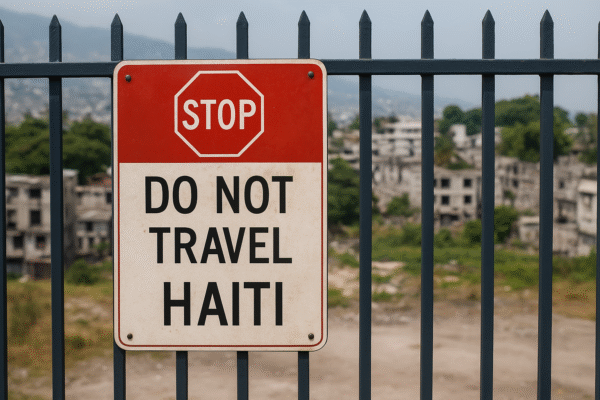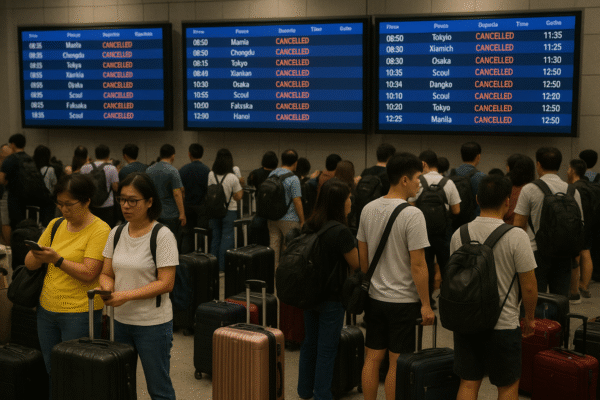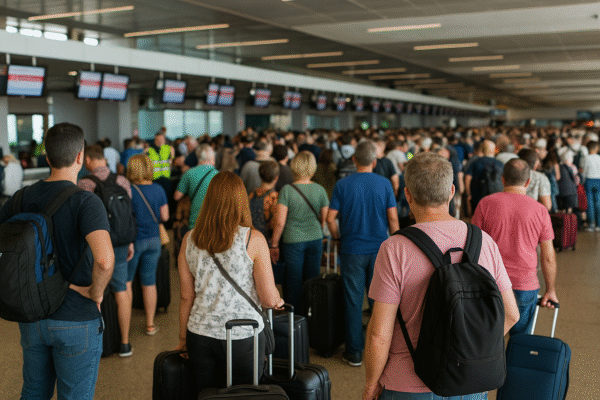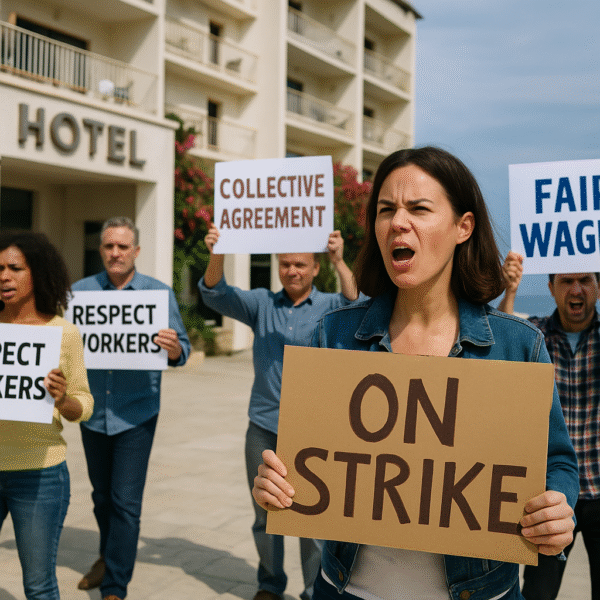Cyprus is on the brink of a major tourism disruption as over 10,000 hotel workers prepare for possible strike action, citing violations of a national collective agreement signed in December 2024. With summer travel peaking and Cyprus expected to welcome a record number of international visitors in 2025, tensions between hospitality staff and hotel employers threaten to derail the island’s economic momentum.
The agreement, hailed as a major step forward for workers’ rights, included a 13th monthly salary, improved provident fund contributions, and holiday compensation at double rates. But unions OYXEKA-SEK and SYXKA-PEO argue many hotel operators have not honored these commitments. Instead, complaints have surfaced of unpaid benefits, unlawful third-country hiring, and circumvention of labor laws.
Hospitality is one of Cyprus’s top economic sectors, contributing nearly 23% of GDP in 2024 according to the Statistical Service of Cyprus (CYSTAT). Popular destinations like Ayia Napa, Limassol, and Paphos are heavily reliant on hotel infrastructure and staff to maintain service standards, especially during peak tourist months from June to September.
Employers Cite Financial Pressure, Unions Demand Fair Pay
Hotel owners have countered that economic constraints, rising inflation, and high operating costs have made it difficult to implement the full terms of the agreement. Yet unions stress that tourism revenues have surged, and that workers—who endured job insecurity during the pandemic—deserve fair compensation now more than ever.
The Cyprus Hotel Association (CHA) has urged restraint, recommending dialogue over disruption. Meanwhile, the Cyprus Ministry of Labour and Social Insurance has called for adherence to the Industrial Relations Code, aiming to defuse the conflict before it damages Cyprus’s global reputation as a reliable travel destination.
Tourists Warned of Potential Disruptions
International travelers with summer bookings are being warned of potential service interruptions should strikes go forward. Hoteliers fear cancelled bookings, poor guest experiences, and negative travel advisories may follow if the issue is not resolved. Some EU-based tour operators have already expressed concern over client uncertainty and have begun issuing flexible cancellation policies for holidays in Cyprus.
European Labor Unrest in Tourism: A Growing Trend
Cyprus is not alone in facing labor turmoil. Across Europe, hospitality workers are mobilizing to demand better conditions amid surging post-pandemic travel demand.
- Spain: In the Balearic Islands, including Ibiza and Mallorca, hotel cleaners and kitchen staff have protested unpaid wages and excessive workloads. In 2024, coordinated strikes led to widespread delays and some hotel closures.
- France: Parisian hotel workers, especially in luxury properties preparing for the 2024 Olympics, walked out in protest of stagnant pay and exploitative work schedules. The CGT union warned that Olympic tourism could be marred by ongoing unrest if demands were not met.
- Italy: Venice hotel staff launched walkouts over wage stagnation and rising living costs. Protests in Rome and Florence echoed similar frustrations, particularly regarding seasonal worker exploitation and poor contract enforcement.
According to the European Trade Union Confederation (ETUC), labor tensions are expected to intensify as tourism demand rises faster than wages across Europe.
Cyprus Caught Between Booming Tourism and Labor Deadlock
Data from the Deputy Ministry of Tourism shows Cyprus welcomed 4.2 million tourists in 2024, nearing pre-pandemic highs. That number is expected to grow in 2025, with early bookings for July and August already exceeding forecasts.
However, the hospitality labor crisis could undermine those gains. A prolonged strike would weaken tourist confidence and undercut Cyprus’s competitive advantage as a Mediterranean destination.
As the dispute reaches a critical point, it also shines a light on the fragility of tourism-led economic models. If the country cannot deliver on service expectations due to labor unrest, it risks long-term damage to brand reputation, particularly among returning visitors from the UK, Germany, Russia, and Israel—its largest source markets.
Path to Resolution: Dialogue or Deadlock?
Calls for arbitration have grown louder, with the Cyprus Employers & Industrialists Federation (OEB) suggesting a formal mediation process. Unions, however, insist that only full enforcement of the collective agreement will halt the strike.
In a recent statement, a spokesperson for SYXKA-PEO noted: “The summer of 2025 will be a test—not just of tourism success, but of justice for those who make it possible. We are not backing down unless our rights are respected.”
If successful, the standoff in Cyprus could become a model for European labor negotiations in the tourism sector. If unresolved, it may contribute to a season of discontent across southern Europe, where tourism booms often mask growing inequality.
Conclusion: A Crossroads for Tourism and Labor in Europe
Cyprus stands at a pivotal moment. With a thriving tourism economy and international attention focused on labor justice, the island’s government and hotel sector must act quickly to bridge the gap between economic ambition and worker rights.
This situation mirrors the larger challenge across Europe—how to ensure that the workers who power one of the continent’s most valuable industries are not left behind. Whether Cyprus can balance growth with fairness may determine not only its 2025 travel season, but the future trajectory of labor relations in the European tourism sector.
For more travel news like this, keep reading Global Travel Wire


















